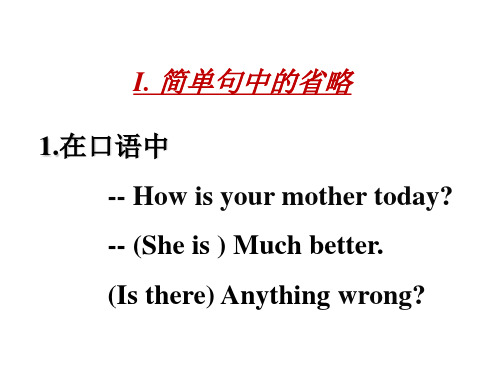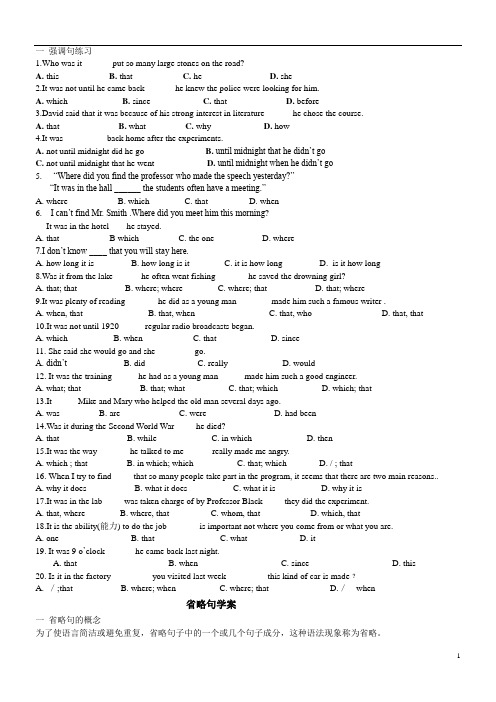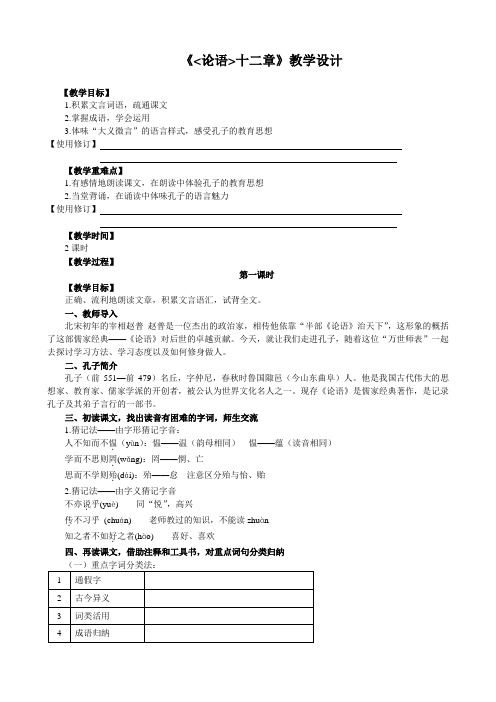省略句学案1
- 格式:doc
- 大小:36.50 KB
- 文档页数:5

文言文句子翻译文言文句子翻译是必考题型。
考试大纲中对翻译的要求是“理解并翻译文中的句子”。
所谓“理解文中的句子”就是能够根据上下文的语境读懂、领会某一个文言句子在文中的意思,能从思想内容、表达效果等方面对整个句子作深入的分析。
要想理解文言句子,就要留心句中的关键性词语,弄明白句中有关词语的指代义,把握分句间隐含的语意关系等。
所谓“翻译句子”就是能将文言句子译成合乎现代语法规范的白话文,做到文从字顺、规范简明、流利畅达。
值得注意的是这一考点里面包含着“理解与现代汉语不同的句式和用法”中的知识和能力要求。
与现代汉语“不同的句式”主要包括:判断句、被动句、倒装句(主要是宾语前置、定语后置和状语后置)、省略句和文言固定结构。
“不同的用法”,主要是指文言词类活用现象。
1.文言文翻译“八法”(1)保留法古文中的专名如人名、地名、年号、国名、官职名、朝代名等一律照抄,不必翻译。
例:元和十年,予左迁九江郡司马。
(《琵琶行并序》)这里除了“予”“左迁”之外,都可保留不译。
(2)替换法有些词,在古书里常用,但在现代汉语里已不用或不常用,或者有些词所表达的意思古今说法不一样,这就要用现代汉语的说法去替换古代的说法。
例:而世之奇伟、瑰怪、非常之观,常在于险远。
(《游褒禅山记》)可将“瑰”换成“珍贵”,“观”换成“景象”。
(3)加字法即在单音节词前或后加字,使之成为包含这个语素的双音节词或短语。
例:天下事有难易乎?(《为学》)“难”和“易”可用加字法翻译。
此句译成:天下的事情有困难和容易之分吗?(4)删略法指删去那些只起语法作用而没有意义的虚词,或某些表敬称或谦称的词。
例:公将鼓之。
(《曹刿论战》)句中的“之”是个音节助词,可不译。
张良曰:“谨诺。
”(《鸿门宴》)句中的“谨”表谦称,可不译。
(5)补充法文言文中有较多的省略成分,在翻译时要将原文中省略的成分补充出来,使句意完整,然后再翻译。
例:不可,直不百步耳,是亦走也。


省略句学案范文范文在英语中,为了使句子简洁明快,突出重点,常用“省略句”,只要不影响句意的表达,能省略的成分尽可能省略。
省略在语言中特别是日常交际中一种普遍现象,了解常见的省略现象有助于我们准确理解句子的语境。
熟悉并掌握一些特殊的省略形式是掌握好省略句的良好途径。
同时应当在书面表达中学会恰当地使用省略,使写出的东西更加精练,干脆利索。
句子成分的省略,可分为以下几种情况:1.省略主语,主谓语或主谓的一部分2.不定式符号to的省略3.不定式结构中动词的省略 4.状语从句中的省略5.定语从句中关系词的省略6.虚拟语气中if和should的省略7.考查not,so,neither,nor的―替代性‖省略一).简单句中的省略:在对话中,交谈双方都知道谈论的对象,则可以省略句子的主语,省略主语和谓语的现象在交际用语中出现的很多。
(1)Looks like rain. (2)Hope to hear from you soon. (3)Sounds like a good idea. (4)Beg your pardon. (5)Feelingbetter today ? (6)This way, please.(7)—What does he want to eat ? —Some rice and vegetables.---(I have) Not (finished my work) yet.在对疑问句的简略回答中,以及在反意疑问句或选择疑问句中, 同时省掉句子几个部分有时好几个句子成分都被省掉: When did you readthe play?,Long ago. Have you ever been to injiang? ,Never.You are a repair worker,aren’t you?(=aren’t you a repair worker?) Has he gone or not? 二). 并列句中的省略:在并列句中,相同的成分如主语,谓语,宾语等都可以省略:(1)Coral is not a plant but a variety of animal life. (2)Myfather planned and built all these houses. (3)John won thefirst race and Jimmy the second. (4)They learn French and we English.(5)Some of us study Russian,and others English.。

一强调句练习1.Who was it ______ put so many large stones on the road?A. thisB. thatC. heD. she2.It was not until he came back ______ he knew the police were looking for him.A. whichB. sinceC. thatD. before3.David said that it was because of his strong interest in literature______ he chose the course.A. thatB. whatC. whyD. how4.It was _________ back home after the experiments.A. not until midnight did he goB.until midnight that he didn’t goC. not until midnight that he wentD.until midnight when he didn’t go5.----“Where did you find the professor who made the speech yesterday?”-----“It was in the hall ______ the students often have a meeting.”A. whereB. whichC. thatD. when6.---I can’t find Mr. Smith .Where did you meet him this morning?--- It was in the hotel ___ he stayed.A. that B which C. the one D. where7.I don’t know ____ that you will stay here.A. how long it isB. how long is itC. it is how longD. is it how long8.Was it from the lake______ he often went fishing_______ he saved the drowning girl?A. that; thatB. where; whereC. where; thatD. that; where9.It was plenty of reading _______he did as a young man _______ made him such a famous writer .A. when, thatB. that, whenC. that, whoD. that, that10.It was not until 1920 _____ regular radio broadcasts began.A. whichB. whenC. thatD. since11. She said she would go and she ________ go.A. didn’tB. didC. reallyD. would12. It was the training _____ he had as a young man _____ made him such a good engineer.A. what; thatB. that; whatC. that; whichD. which; that13.It _____ Mike and Mary who helped the old man several days ago.A. wasB. areC. wereD. had been14.Was it during the Second World War ____ he died?A. thatB. whileC. in whichD. then15.It was the way_______ he talked to me______ really made me angry.A. which ; thatB. in which; whichC. that; whichD. / ; that16. When I try to find ____ that so many people take part in the program, it seems that there are two main reasons..A. why it doesB. what it doesC. what it isD. why it is17.It was in the lab ____ was taken charge of by Professor Black ____ they did the experiment.A. that, whereB. where, thatC. whom, thatD. which, that18.It is the ability(能力) to do the job _______is important not where you come from or what you are.A. oneB. thatC. whatD. it19. It was 9 o’clock ______ he came back last night.A. thatB. whenC. sinceD. this20. Is it in the factory_________ you visited last week_________ this kind of car is made﹖A. /;thatB. where; whenC. where; thatD./when省略句学案一省略句的概念为了使语言简洁或避免重复,省略句子中的一个或几个句子成分,这种语法现象称为省略。

《<论语>十二章》教学设计【教学目标】1.积累文言词语,疏通课文2.掌握成语,学会运用3.体味“大义微言”的语言样式,感受孔子的教育思想【使用修订】【教学重难点】1.有感情地朗读课文,在朗读中体验孔子的教育思想2.当堂背诵,在诵读中体味孔子的语言魅力【使用修订】【教学时间】2课时【教学过程】第一课时【教学目标】正确、流利地朗读文章,积累文言语汇,试背全文。
一、教师导入北宋初年的宰相赵普赵普是一位杰出的政治家,相传他依靠“半部《论语》治天下”,这形象的概括了这部儒家经典——《论语》对后世的卓越贡献。
今天,就让我们走进孔子,随着这位“万世师表”一起去探讨学习方法、学习态度以及如何修身做人。
二、孔子简介孔子(前551—前479)名丘,字仲尼,春秋时鲁国陬邑(今山东曲阜)人。
他是我国古代伟大的思想家、教育家、儒家学派的开创者,被公认为世界文化名人之一。
现存《论语》是儒家经典著作,是记录孔子及其弟子言行的一部书。
三、初读课文,找出读音有困难的字词,师生交流1.猜记法——由字形猜记字音:人不知而不愠.(yùn):愠——温(韵母相同)愠——蕴(读音相同)学而不思则罔.(wǎng):罔——惘、亡思而不学则殆.(dài):殆——怠注意区分殆与怡、贻2.猜记法——由字义猜记字音不亦说.乎(yuè) 同“悦”,高兴传.不习乎(chuán) 老师教过的知识,不能读zhuàn知之者不如好.之者(hào) 喜好、喜欢四、再读课文,借助注释和工具书,对重点词句分类归纳(一)重点字词分类法:参考:1.通假字不亦说乎(“说”同“悦”,愉快)吾十有五而志于学(“有”同“又”)2.古今异义有朋自远方来(古义:志同道合的人;今义:朋友)可以为师矣(古义:可以凭借;今义:表示可能、许可)为人谋而不忠乎(古义:竭尽自己的心力;今义:忠诚)三军可夺帅(古义:改变;今义:抢夺)3.词类活用学而时习之(“时”,时常,名词作状语)吾日三省吾身(“日”,每天,名词作状语)温故而知新(“故”“新”,“旧知识”“新知识”,都是形容词作名词)传不习乎(“传”,老师的知识,动词作名词)饭疏食(“饭”,吃,名词作动词)4.成语归纳不亦乐乎:原意是“不也快乐吗?”现用来表示极点的意思。

省略句专项练习一、解题方法1. 根据上下文的语言环境,把承前省略的部分补充完整。
eg. One of the sides of the board should be painted yellow, and ________ . (2000京、皖春季卷) A. the other is white B. another white C. the other white D. another is white解析:选C。
木板有两面,故排除B、D;第二句补充完整为and the other side of the board should be painted white.为先行词的定语从句省略的具体内容参阅《非常学案》P110—111专项训练1.—I hope you’ve read the instructions.—Yes, of course _______.A. I didB. I willC. I doD. I have2.It is said that the poet drowned when he fell into a river while ______ hold of the reflection of the Moon.A. trying takingB. tried to takeC. trying to takeD. tried taking3. If I am admitted by a famous college this summer, my parents will take me to Hong Kong andMacao.If ,they .A.not;won’t B.no;don’t C.not;haven't D.no;didn’t4. Comparison may make something appear more beautiful than it is when alone.A.to see B.seeing C.is seen D.seen5. Girls used to take fewer advanced math courses than boys but now they are taking just ________.A.as much B.so much C.as many D.so many6. —Will you go home tomorrow evening?—No,I am going to a lecture,or at least I am planning________.A.so B.to C.it D.that7. —I hear Sarah was badly injured in the car accident.—________,let's go and see her right away.A.If ever B.If so C.If not D.If possible8. He is supposed to make his visit to the club soon, but I’m not sure whether he or not.A.does B.is C.had D.will9. Mr. Brown was much disappointed to see the washing machine he had had went wrong again.A. itB. it repairedC. repairedD. to be repaired10. Unless to speak, you should remain silent at the conference.A. invitedB. invitingC. being invitedD. having invited11. Jim is awfully difficult to make friends with, but the friendship of his, ,is more true than any other.A. once gainedB. when to gainC. as gainedD. while gaining12. —Do you think it's going to rain over the weekend?—.A.I don't believeB.I don't believe itC.I believe not soD.I believe not13. —What should I do with this passage?— the main idea of each paragraph.A. Finding outB. Found outC. Find outD. To find out14.—_______ I am caught smoking again?—You are sure to be punished.A. What forB. What ifC. If onlyD. Only if15. —Does your parents have the intention to send you to study abroad?—Yes, they intend _______ .A. /B. toC. soD. that16. They will keep the library open until 9:00 p.m. _______.A. when necessaryB. if is necessaryC. if it necessaryD. if necessarily17. —Did they stay up last night?—They _______, for the light in their dormitory was on until very late.A. mustB. must stayC. must have stayedD. must have18. When first _____ to the market, these products enjoyed great success.A. introducingB. introducedC. introduceD. being introduced19. It shames me to say it, but I told a lie when _____ at the meeting by my boss.A. questioningB. having questionedC. questionedD. to be questioned20. What surprised me was not what he said but _____ he said it.A. the wayB. in the way thatC. in the wayD. the way which21. —Susan, will you please go and empty that drawer?—______?A. What forB. What is itC. How is itD. How come22. I’m looking forward as much to her return as she herself to _____ me.A. have seenB. seeingC. meetD. be met23. Who can you turn to in time of danger, if not ______?A. ourselvesB. oursC. weD. us24. —Did you visit the museum last week ?—No, we _____, but we spent too much time shopping.A. could haveB. couldC. must haveD. must25. —Is your mother going to the supermarket ?—No, ______.A. she doesn’tB. she’s cookingC. she gets by busD. to a tailor’s shop26. _____, I will help you with your work.A. If I am possibleB. If it possibleC. If possibleD. Possible27. —Do you follow me? —Yes, _____.A. it is goodB. I willC. perfectlyD. very good28. —How are you getting on with your work ?—Oh, I’m sorry. Things aren’t going so well as _____.A. plansB. planningC. plannedD. to plan29. —Are you a teacher?—No, but I _____. I worked in a middle school for three years.A. amB. willC. doD. was30. —How many poor counties will there be in our province by 2010?—There will be only a few, if _____.A. muchB. someC. anyD. many31. —Why didn’t you come to Mike’s birthday party yesterday ?—Well, I_____, but I forgot it.A. shouldB. mustC. should haveD. must have32. Doctors have said that as many as 50% of patients don’t take medicine _____.A. like directedB. to be directedC. as directedD. so that directed33.The traditional goal of science is to discover how things are, not how they ought ____.A. toB. to beC. beD. have been34.---Did you work in the lab every afternoon?---No, but sometimes, I wish I ____.A. had time toB. had time to doC. have time toD. have time35.The workers did all ___ good care of the old man.A. they could to takeB. they could takeC. which they could to takeD. what they could to take36.The photographs of other planets taken by satellite are clear than ___.A. the earthB. those taken from the earthC. those of the earthD. of the earth37. ___ the road, don’t forget to look both ways.A. Though crossingB. While you crossedC. While crossingD. Cross38.Chemistry is the science of substances ___ the science of energy.A. and is physicsB. or is physicsC. and physicsD. or physics is39. ---Susan, go and join your sister cleaning the yard.--- Why ___? John is sitting there doing nothing.A. himB. heC. ID. me40.When ___, the museum will be open to the public next year.A. completedB. completingC. being completedD. to be completed41.The rent is expensive. I’ve got half the space I had at home and I’m paying ____here.A. as three times muchB. as much three timesC. much as three timesD. three times as much42. Though_______ money, his parents managed to send him to university.A. lackedB. lacking ofC. lackingD. lacked in43.— I hate talking with that guy. Look, he is coming. What should I do?—Don’t speak until _____.A. speakingB. spoken toC. spokenD. speaking to44. — How are you getting on with your work?—Oh, I’m sorry. Things aren’t going so well as _____.A. plansB. planningC. plannedD. to plan45. He is only too ready to help others, seldom, _____, refusing them when they turn to him.A. if neverB. if everC. if notD. if any46. While _____ holding talks with President Hu Jintao, US President George W. Bush thanked China for its important role in the Six-Party Talks.A. he isB. he wasC./D. B or C47. —You should have thanked her before you left.—I meant _____, but when I was leaving I couldn’t find her anywhereA. to thankB. toC. /D. thanking48. Water, _____ enough, can change into vapor quicklyA. when heatedB. while heatingC. when to be heatedD. when is heated49. —Should I look up each word that I don’t understand?— No, turn to your dictionary only when _____.A. you are necessaryB. you needC. necessaryD. you are needed50. — You seem to have lost your way. _____?— I'm looking for Wangfujing Street.A. What forB. Need helpC. Why soD. Where go【答案】1—5 D C A D C 6—10 B B D C A 11—15 A D C B B 16—20 A D B C A21—25 A B D A D 26—30 1. CCC D C 31—35 C C B A A 36—40 B C C D A41—45 D C BCB 46—D B A C BThere are no secrets to success. It is the result of preparation, hard work, and learning from failure.- Colin L. Powell成功没有诀窍.它是筹备,苦干以及在失败中汲取教训的结果.。
第16讲省略句为了避免重复或是由于习惯省略句子中的一个或几个句子成分,我们称着总语法现象为省略。
省略在英语语法中很常见,尤其是在口语中。
一.省略主语例:(I am)Glad to see you .(I’ll) See you later.(I) Thank you for coming here.(Do you) Want some more ?(It) Sounds like a good idea.(It) Doesn’t matter.二.省略谓语或者谓语的一部分例:(Is there)Anything I can do for you?A:Do you ofen go to see films?三.省略主语或者谓语中的主要部分例:A:Would you like to do it with me?B:Sure/Certainly/Of course.(I’d like to)四.不定式to后省略动词1.为了避免重复,再次出现时,在want,wish,hope,try,plan,like,love,hate后,往往只保留不定式符号to,而省略后面的动词。
例:A:Would you like to join us in the game?B:I’d like/love to.A:Did you go to Shanghai last month?B:No,I planned to (go to Shanghai last month).2.在词组be able to,used to,be going to和情态动词ought to,have to,need等词后。
例:He never goes there by bus now but he used to (go there by bus).I’ve not been to America but I am going to (be there ).五.用语中的省略例:Why not watch TV?=Why don’t we watch TV?六.在复合句中的省略1.在宾语中从句中的省略例:The letter says (that) they are ready for it.We hope (that) we can win.2.在定语从句中的省略1)关联词在定语从句中担任宾语时可以省略。
《省略句》教案一、教学目标:学会辨别省略句,学会在翻译中补充省略成分。
二、教学重点:在翻译中补充省略成分。
三、教学过程:(一)导入:学文言文,句式的处理是一个重点也是个难点。
但是依照一定的原则去把握,也是比较容易找到这个重难点的突破口来的。
我们之前是梳理了倒装句,被动句。
我们顺着学习特殊文言句式的思路,来研究一下新的一种特殊句式。
在研究这种新句式之前,我们先来做下“热身运动”。
(学生回答“课前热身”的问题,并总结。
)省略句,无论在现代汉语里边还是在古代汉语里边,都是比较常见的。
只要不影响句意的表达,基本上都可以出现省略。
例如,淮河运输服务公司,我们省略成“淮运”,上海测绘研究所,我们省略成“上测所”。
当然,这样的省略不是很好,省略了之后就可能闹笑话了。
文言文里边的省略,如果我们不注意,闹笑话事小,丢分事大。
因此,我们需要从理性上对文言文存在的几种常见的基本类型做个总结。
我们通过做题来做个总结。
(二)推断省略句的几种基本类型。
练习1:翻译下列句子,体会省略特点。
1、及至始皇,奋六世之余烈。
(奋:发扬,余烈:留下来的功业)2、沛公谓张良曰:“(公)度我至军中,公乃入。
”3、(梁惠王)曰:“不可,(五十步)直不百步耳,是亦走也。
”(孟子)曰:“王如知此,(王)则无望民之多于邻国也。
”【板书】特点:省略了主语,省略主语主要用三种模式:第一是承前省,第二是蒙后省,第三是对话省。
练习2:翻译下列句子,体会省略特点。
1、夫战,勇气也。
一鼓作气,再(鼓)而衰,三(鼓)而竭。
2、五步(有)一楼,十步(有)一阁。
【板书】特点:省略了谓语动词。
练习3:翻译下列句子,体会省略特点。
1、项伯乃夜驰之沛公军,私见张良,具告(之)以事。
2、竖子不足与(之)谋。
【板书】特点:省略了宾语,省略宾语有两种模式:第一是省略了动词后面的宾语,一种是省略了介词后面的宾语,从我们所做的练习来看,省略介词后面的宾语比较常见。
练习4:翻译下列句子,体会省略特点。
高考语文二轮专题学案:文言文特殊句式和用法高考语文二轮专题学案:文言文特殊句式和用法一、判断句用“者……也”表判断“陈胜者,阳城人也。
”(陈胜是阳城人)“方柯者,语文小栈之站长也。
”(方柯是语文小栈网站的站长)“廉颇者,赵之良将也。
”(廉颇是赵国的良将)句末用“也”表判断“城北徐公,齐国之美丽者也。
”(城北徐公是齐国的美丽的人)“方柯,天才也。
”(方柯是天才)用“者”表判断“方柯者,中国之人。
”(方柯,是中国人)用“为”表判断“为天下理财,不为征利。
”(……不能说是设法生财)用“乃”表判断“是乃狼也。
”(这是狼)“电脑乃高科技用具。
”(电脑是高科技用具)文言文判断句最显著的特点就是基本上不用判断词"是"来表示,而往往让名词或名词性短语直接充当谓语,对主语进行判断,其句式有如下几种表示法:“......者,......也。
”这是文言判断句最常见的形式。
主语后用“者”,表示提顿,有舒缓语气的作用,谓语后用“也”结句,对主语加以肯定的判断或解说。
如:“陈涉者,阳城人也。
”(《史记.了涉世家》)“......,......也。
”判断句中,有时“者”和“也”不一定同时出现,一般省略"者",只用“也”表判断。
如:“操虽托名汉相,其实汉贼也。
”(《资治通鉴》)“......者,......。
”有的判断句,只在主语后用“者”表示提顿,这种情况不常见。
如:“四人者,庐陵萧君圭君玉,长乐王回深父,余弟安国平父,安上纯父。
”(王安石《游褒禅山记》)“......者也。
”在句末连用语气词“者也”,表示加强肯定语气,这时的“者”不表示提顿,只起称代作用。
这种判断句,在文言文中也比较常见。
如:“城北徐公,齐国之美丽者也。
”(《战国策.齐策》)无标志判断句。
文言文中的判断句有的没有任何标志,直接由名词对名词作出判断。
如:“刘备天下枭雄。
”(《赤壁之战》)另外,在文言文中有时为了加强判断的语气,往往在动词谓语前加副词“乃、必、亦、即、诚、皆、则”等。
高考复习专题融合串讲学案(简单句并列句复合句省略句)一.简单句简单句的定义:简单句就是由一个分句构成的句子。
在简单句中,分句和句子合二为一,从而结构合一,分句的成分就是句子的成分。
陈述句、疑问句和感叹句都可以在简单句中使用。
如:(1)In your letter you asked about the time in different areas of the States .你在来信中问到美国不同地区的时间问题。
(陈述句)(2)Is American country music about modern life ?美国乡村音乐写的是现代生活吗?(疑问句)(3)Wash your hands with soap at the end of your experiment . 在做完实验后要用肥皂洗干净你的双手。
(祈使句)(4)What a difficult case I must have been to this young teacher ! 对这位年轻教师来说,我是一个多么难教的学生啊!(感叹句)简单句的结构简单句包含一个分句,也就是一个“主语+谓语”(基本成分)的结构。
如:(1)It is a very slow task . 它是一项费时的工作。
(2)Flies and mosquitoes are very dangerous insects。
苍蝇和蚊子是害虫。
(主语并列)(3)He studied law in his spare time and became a lawyer . 他在业余时间学法律,还当了律师。
(谓语并列)(4)The north has warm , dry winters and hot , wet summers . 北方有温暖、干燥的冬天和炎热、潮湿的夏天。
(宾语并列)二.并列句并列句(compound sentence)就是由两个或两个以上的分句构成、且各个分句地位相等的句子。
省略句学案编写人:王俊审核人:严敏使用时间:为了使讲话和行文简洁,句中某些成分有时可省略。
省略可分以下几种情况:一、简单句中的省略1.省略主语:祈使句中主语通常省略。
其他省略主语的用法多限于少数现成的说法。
(I) Thank you for your help.(I) See you tomorrow.(It) Doesn't matter.2.省略主谓语或主谓语的一部分。
(There is) No smoking.(Is there) Anything wrong?Why (do you) not say hello to him?3.不定式的省略(1)使役动词let, make, have及感官动词see, watch, hear, notice, observe, feel, look at, listen to 等后面作宾语补足的不定式要省去to, 但在被动句时应加上to。
I saw the boy fall from the tree.The boy was seen to fall from the tree.2)mean, try, want, afford, decide, refuse, wish, like, need, would like, would love...等后面接不定式作宾语时,省略作宾语的不定式。
只保留不定式符号to, 但如果该宾语是动词be 或完成时态的不定式时,则需在to后加上be 或have。
—Are you going there?—Y es, I'd like to (go there).—Are you an engineer?—No, but I want to be (an engineer).3)tell, warn, order, advise, ask, expect等动词后接不定式作宾补时常省略不定式的宾语补足语。
The students want to enter the lab, but the monitor advises them not to (enter the lab).4)两个或两个以上的动词不定式并列在一起由and / or 连接时,第1个不定式带to, 后面的不定式可省去to。
但如表示对比(照)等,则不省略to。
Her job is to take care of the children and (to) wash clothes. It's better to laugh than to cry.5)主(宾)语补足语中的to be 往往省略。
He was thought (to be ) the cleverest boy in the group.6)特殊结构中的省略would sooner, had better, do nothing but, have nothing to do but, there's nothing to do but, can't help but, rather than 等后的不定式的符号to常省略。
He would sooner die than surrender.I'd rather look after the baby than wash dishes.7)主语部分有一个表“做”的do 的各种形式时,表语不定式常省略“to”。
What I really want to do is (to) go to the cinema.4.省略表语—Are you thirsty?—Y es, I am (thirsty).5.同时省略几个成分Let's meet at the same place as (we met) yesterday.—Have you finished your work?—(I have) Not (finished my work) yet.二、并列句中的省略两个并列分句中,后一个分句常省略与前一分句中相同的部分。
My father is a doctor and my mother (is) a nurse.I study at college and my sister (studies) at high school.三、主从复合句中的省略1.主句中有一些成分被省略。
(I'm) Sorry to hear that you are ill.(It is a) Pity that he missed such a good chance.2.从句的省略(1)宾语从句以which, when, where, how和why引导的宾语从句在其谓语与主句谓语相同时,可省略全部谓语,甚至主语也省略,仅保留一个wh-词。
She will go to Beijing, but I don't know when (she will go to Beijing.)(2)状语从句在时间、地点、让步、方式、条件状语从句中,如果主语与主句主语一致,或者主语是it,那么动词be及其主语通常可省略。
常见的有以下几种:时间状语从句:Be careful when (you are) crossing the street.条件状语从句:He won't go to the party unless (he is) invited.比较状语从句:Country music today remains much the same as (it was) before.让步状语从句:Whether (it is) right or wrong, his opinion should be paid attention to.注意:though和as 引导让步状语从句时,通常从句要倒装。
从句倒装时,如果从句的表语是可数名词单数,将名词提前时,名词前面的冠词a / an须省略。
Child as / though he is, he knows much about the society.=Though he is a child, he knows much about the society.注意:有些由if 构成的省略结构,已属固定短语,如if any, if necessary, if possible, if not, if so等。
If necessary, ring me at home.—He may be busy.—If so, I'll call later. If not, can I see him now?(3)修饰名词way 的限制性定语从句常省略in which或that。
Is this way you talk to your parents?(4)强调句It is / was...that...,当强调疑问句时,that 常可省略。
Why was it (that) you were ten minutes late?用so或not时切不可用it或that代替。
—Is he coming back tonight?—I think so.—Is he feeling better today?—I'm afraid not.这种用法常见的有:How so? Why so? Is that so? I hope so. He said so.及I suppose not. I believed not. I hope not等。
(但I don't think so比I think not更常用)。
四、连词that的省略1.宾语从句中常省略连词that,但也有不能省略的情况(参看“名词性从句”等有关部分)。
2.在定语从句中,that在从句中作宾语时可省略。
3.引导主语从句、同位语从句等的连词that一般不可省略。
在表语从句中偶尔可省略。
在近五年的高考试卷中强调句、省略句已经成为高考热点。
命题者加大了对句子结构复杂程度和知识面的考查,同时注重考查知识之间的交叉。
这就要求学生在复习和备考中注意总结,全面把握,深入研究。
具体把握强调句以下四大考点:1.考查强调句式的基本结构2.考查含有“not...until...”句型的强调句式3.考查强调句式的疑问句4.考查强调句式的正确判断省略是高考英语考试大纲要求掌握的语法项目之一,虽然不是每年必考项目,但不少省份有所涉及。
从命题的趋势来看,更侧重考查省略在交际中的功能,考查语法知识间的交叉使用。
1. (2011江苏卷33)It sounds like something is wrong with the car’s engine._______ , we’d better take it to the garage immediately.A. OtherwiseB. If notC. But for thatD. If so2. (09湖南)Every evening after dinner, if not from work, I will spend some time walking my dog.A. being tiredB. tiringC. tiredD. to be tired3. (09江西)Some of you may have finished unit one. _____ , you can go on to unit two.A. If you mayB. If you doC. If notD. If so4. (07全国Ⅰ)We all know that, _________ , the situation will get worse.A.not if dealt carefully withB.if not carefully dealt withC.if dealt not carefully withD.not if carefully dealt with5. (07安徽)In my opinion, life in the twenty-first century is much easier than _______.A.that used to beB.it is used toC.it was used toD.it used to be6.(2010湖南湘潭期末联考)—I hope he won't get ill during the examinations.—________. He has been very well recently.A.Certainly B.No C.Not D.Y es7.(2010湖南雅礼中学月考) He is only too ready to help others, seldom,________,refusing them when they turn to him.A.if never B.if ever C.if not D.if any。